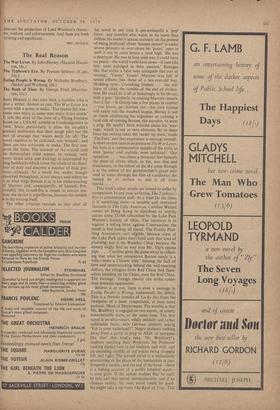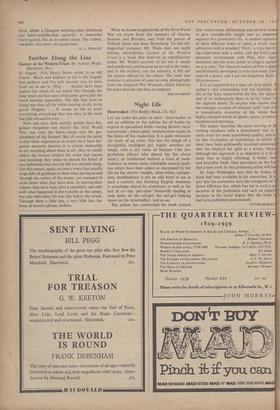The Real Reason
The Bank of Time. By George Friel. (Hutchin- son, 15s.)
JOHN HERSEY is that rare bird, a novelist who is also a writer. Almost as rare, The War Lover is a novel with a point to make. 'The reason for war : some men enjoy it, some men enjoy it too much.' It tells the story of the crew of a Flying Fortress based on a USAAF airfield in Cambridgeshire in 1944. More particularly it plots the co-pilot's gradual realisation that their tough pilot has the sort of courage that 'wants death for all.' The novel requires to be criticised, not 'noticed'; and there are two criticisms to make. The first con- cerns the form. The account of the crucial raid on Schweinfurt (told minute by minute, with every detail alive and kicking) is interrupted by long flashbacks which cover the whole of the fliers' tour of duty and describe a number of their pre- vious missions. As a result the reader, though absorbed throughout, is not always sure where he is or what stage Boman is at in his understanding of Marrow and, consequently, of himself. Pre- sumably this to-and-fro is meant to sustain ten- sion; the device is superfluous, because the tension is in the writing itself.
The other criticism reminds us that after all
the novel in our time is pre-eminently a 'pop' form: any novelist who wants to do more than titillate his reader's sexual curiosity on the pretext of being profound about 'human nature' is under severe pressure to over-stress his 'point,' even to spell it out in neon letters a yard high. 'He was a destroyer. He was in love with war. I could have no peace—the world could have none—if men like him were indulged in their passion.' Passages like that strike a false note alongside this sort of writing: `Voom! Voom! Marrow was full of sound effects, like those of a ten-year-old boy. Skidding tyres. Crunching fenders . . . the col- lapse of cities, the rumble of the end of civilisa- tion. He could do it all so hauntingly in his throat, with a grin.' Similarly, in making Marrow remark that if the —th Group lose a few planes in combat =you know, get thinned out'—his own Group will easily win the baseball league, Hersey is not so much reinforcing his argument as running a fatal risk of causing Boman, the narrator, to seem a prig. He needn't have worried about his 'mes- sage,' which is not so very abstruse. By its sheer force his writing takes the reader up there, inside 'The Fort,' and that experience is message enough. A short review cannot do justice to TheWar Lover, but here is a representative sample of the style, at once 'poetic' and realistic, even technical : 'Our squadron . . . was about a thousand feet beneath the plate of cirrus which, so far, was thin and translucent, so the colour of the sky came through it as the colour of my grandmother's grape jelly used to come through the film of candlewax she melted on its surface to seal it off from mould. . .
This week's other novels are bound to suffer by comparison. In any case, as fiction, The Typhoon's Eye is conventional stuff. As a tract for the times it is something more—a sensible and restrained footnote to The Ugly American. Caroline Weitzel comes to Hong Kong to distribute to worthy causes some $5,000 subscribed by the Lake Park Women's Society of Ohio. The intention is to register a telling blow against Communism; the result is bad feeling all round. The Family Plan- ning Association isn't eligible, because some of the Lake Park ladies don't hold with that kind of planning; nor is the Wanchai Clinic, because the money might find its way into Mr. Yip's opium pipe. . . . Caroline gives the game away in reflect- ing that what her compatriot Reston needs is a wife—'even a Chinese wife.' Sensing the rack of love and understanding behind the well-meaning dollars, the refugees from Red China find them- selves standing up for China, even for Red China. The message : foreign charity can strike colder than domestic oppression.
Believe it or not, there is even a message in Eating People is Wrong, underneath the debris. This is a frenetic remake of Lucky Jim from the viewpoint of a more sympathetic, at least more pathetic, Head of Department. The trouble is that Mr. Bradbury is engaged on two novels, of utterly irreconcilable sorts, at the same time. The first novel is an ultra-smart, wildly unlikely and rather unlikeable farce, with German students asking `VOt is your vaderland?', Negro students rushing away from a party to pray to Allah 'or someone like that' (for God's sake, Mr., Bradbury !), students insulting their Professor, the Professor making dismal love to his students and staff, and an unending rumble of red bricks being dropped left and right. The second novel is a melancholy 4uestioning of the pIace'of the humanities in con- temporary society; and the end of the book—there is a feeling account of a Public ho'spital ward— is even grim. If the author realises that he can't be real and that unreal simultaneously, and if he chooses reality, his next novel could be good. He might take a tip from The Bank of Time. This book, about a Glasgow working-class childhood and lower-middle-class maturity, is somewhat heavy-gaited, but at no point cheap. The author, one feels—for once—is a good man.
D. .I. ENRIGHT











































 Previous page
Previous page